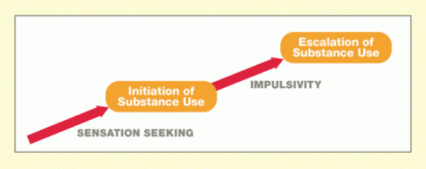Young teens who avidly seek novel and intense sensations are slightly more likely than their more cautious peers to initiate substance use, NIDA-supported researchers report. However, these teens are not more likely to become regular substance users within the next 3 years unless they also are prone to devalue distant consequences and act impulsively.
Dr. Atika Khurana at the University of Oregon, working with colleagues at the University of Pennsylvania and Children's Hospital of Philadelphia, formally assessed sensation seeking and two indicators of impulsivity in 382 children age 11 to 13 years. They asked the young people to:
- Rate their levels of agreement with statements that indicate eagerness to seek sensations (e.g., “I would like to explore strange places”, “I like wild parties”).
- State whether or not they engaged in a range of impulsive behaviors (e.g., “Do you usually do or say things without thinking?”).
- Declare how much of a monetary reward they would be willing to forego to be paid immediately rather than in the future.
The researchers also asked the young study participants if they had used alcohol, marijuana, or tobacco in the last 30 days, then followed up with them about their substance use annually for 3 years.
During the follow-up, roughly 60 percent of the young people avoided the three substances altogether; 10 percent used them infrequently and intermittently; and 30 percent started using them early in the follow-up and escalated, culminating in the use of 1-2 of the substances, on average, during the month prior to the final assessment.
Comparing the young people’s answers on initial assessments to their subsequent substance use, the researchers found that:
- Motivation to seek sensations predicted the likelihood of initiating substance use; experimenters and escalators scored similarly on the assessment of sensation seeking, with escalators scoring significantly higher than the abstainers.
- Impulsivity predicted the likelihood of escalating substance use; escalators’ impulsivity scores were significantly higher than those of the experimenters and abstainers, who had similar scores to each other (See Figure).
 Figure. Sensation Seeking Promotes Initiation of Substance Use, While Impulsivity Contributes to Its Escalation Young teens who are more highly motivated to seek novel or intense sensations are more likely to initiate use of alcohol, marijuana, or tobacco. Among teens who have initiated substance use, those who are more impulsive are more likely to escalate their use.
Figure. Sensation Seeking Promotes Initiation of Substance Use, While Impulsivity Contributes to Its Escalation Young teens who are more highly motivated to seek novel or intense sensations are more likely to initiate use of alcohol, marijuana, or tobacco. Among teens who have initiated substance use, those who are more impulsive are more likely to escalate their use.(See Text Description of Graphic below)
Dr. Khurana and colleagues further linked the children’s impulsivity, and hence their likelihood of escalating substance use, to their performance on tests of working memory. Working memory scores reflect the effectiveness of the brain’s executive control system—the source of one’s capacity to store, call up, and bring information to bear in making decisions. Taken together, the new study’s results confirm, for the first time in humans, the “neurobehavioral imbalance” model of risk for substance use disorders. The model, which has previously been shown in animals, posits that individuals whose brains are highly sensitive to rewards and have weak executive control systems have the highest risk for substance use disorders.
The researchers note that some studies have shown that youths who are eager to experience new sensations tend to have better-than-average control over impulses to act without thinking. They conclude that youths in whom both traits are strong are more likely than others to initiate substance use, but once started, less likely to get caught up in it. The new findings suggest that interventions that increase executive control during early adolescence can reduce problematic substance use into mid-adolescence, and possibly the development of substance use disorders.
This study was supported by NIH grants DA018913 and DA033996.
- Text Description of Graphic
-
The figure shows a flow chart illustrating the relationship between sensation seeking, impulsivity, and initiation and progression of drug use. The bottom left arrow shows that high levels of sensation seeking lead to a greater likelihood of initiating substance use (first panel). The arrow leading from this first panel shows that, among those who begin using substances, higher impulsivity is associated with escalation of substance use (second panel).
Source
Khurana, A.; Romer, D.; Betancourt, L.M.; et al. Experimentation versus progression in adolescent drug use: A test of an emerging neurobehavioral imbalance model. Development and Psychopathology 27(3):901-913, 2015. Abstract
